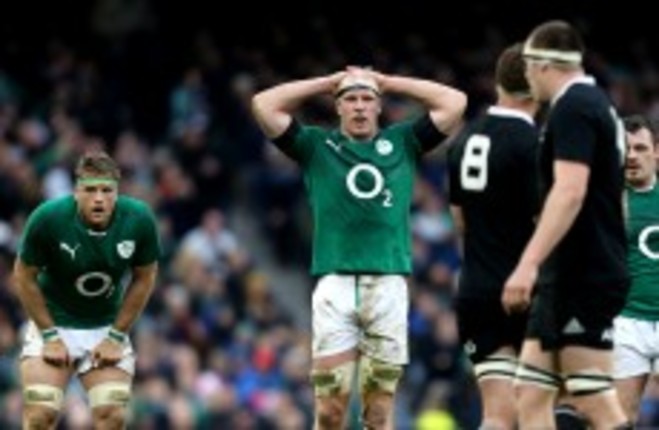SUNDAY’S GAME WAS like a movie that makes you think long after the final credits.
Anyone who was at the Aviva or watched it on television will have been replaying incidents in their head all week.
There was the brutal end game, the Sexton miss, the McGrath penalty, but also telepathic offloads, intricate counter attacks, front-rowers executing delicate switch moves.
Painful as it was, this, finally, was an Irish performance that answered a few questions.
The game was constantly on a knife edge, there was a sense that either team could score at any moment. There were more finger-tip catches and last ditch super hero tackles in one game than most players pack into a season.
Sean O’Brien’s basketball style finger-roll offload to keep the ball airborne for a fraction longer so that Conor Murray could stoop to catch it, typified the theme of this game – the courageous plays were rewarded, the percentage plays were doomed.
This wasn’t Ireland’s best ever performance, it was full of flaws, but it was arguably our most ambitious ever display, containing the greatest phases of play in our history.
Jamie Heaslip missed his first tackle on Aaron Cruden, on Paul O’Connell’s second carry of the game he got turned over, Brian O’Driscoll’s first pass was wild, Devin Toner knocked on twice from restarts, Conor Murray kicked the ball away too much. This was far from perfection, but the difference was, when Ireland were good, they made it count.
When they attacked they were genuinely world class in their handling, their passing, the speed at which they took the ball, the way they absorbed contact. The build-up to the Rory Best try is arguably the most efficiently brilliant rugby this country has ever produced.
In defence too, Ireland were ambitious. They didn’t seek to absorb and contain their opponent, they went for broke. Think of Tommy Bowe’s wrap around tackles, the way D’Arcy burst through rucks when New Zealand had the ball, or Heaslip perfectly timing his defensive runs in the final 10 minutes.
The way teams win rugby games now is not by playing percentages, its by ruthlessly going for the jugular when they have the chance. To beat New Zealand or South Africa, to make a World Cup semi-final, to beat France in Paris, you need your hooker throwing dummies, your centres forcing turnovers out of nothing, your fullback running in tries from 60 metres.
It is now clear, as admitted by Joe Schmidt, that Ireland targeted the New Zealand game. They gambled all on black. They were right to do that, even though it didn’t work. If we are to win big tournaments again, we have to take risks with selection, with targeting the big games and we must gamble when playing the best teams.
 Gordon D'Arcy, Brian O'Driscoll and Tommy Bowe tackle Ma'a Nonu. Credit: INPHO/Ryan Byrne
Gordon D'Arcy, Brian O'Driscoll and Tommy Bowe tackle Ma'a Nonu. Credit: INPHO/Ryan Byrne
In 2009, the Grand Slam year, Declan Kidney took perhaps the biggest risk of his career by rotating selection for the game against Scotland. It worked.
Padraig Harrington says consistency is over-rated. Win two tournaments a year, stink up the rest of them, and you have yourself a very successful golfer. He believes you don't even need to play well for all four rounds to win a major, you just need to produce excellence on the final day.
Well, international rugby now also rewards the high roller, the team that can turn it on in for brief periods, at key moments in a game. Wales are either world beaters or flops, but every other European side would love to have their last decade of highs and lows.
Ireland certainly can't be accused of being a consistent rugby team. In the last seven years we have been destroyed by Georgia, and destroyed New Zealand. We laugh at France, but we are equally schizophrenic.
It is clear after Sunday, however, that it suits our mentality to go all out, to commit 100% to the difficult moves, to be big game players. The winner of the 2014 Six Nations championship won't play well every week. Its all about choosing your moment.

